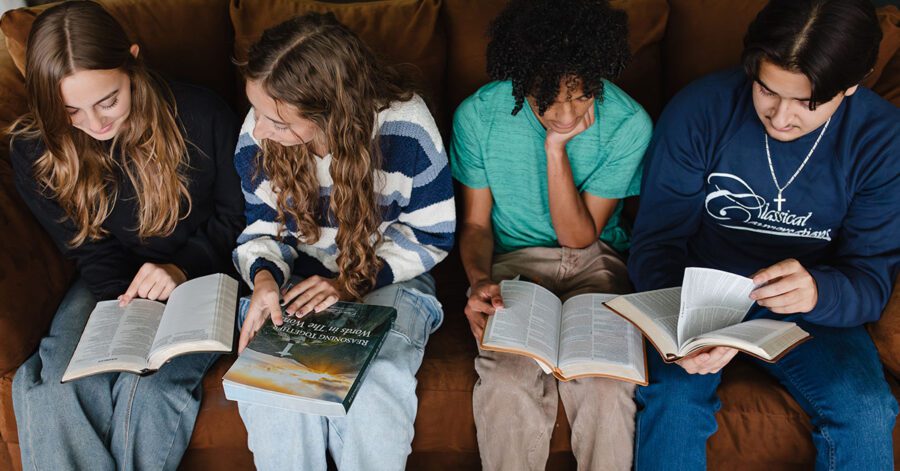As a tutor, at the end of every Challenge B year, I feel like I couldn’t possibly love a class more. Then the next year’s class comes along and my newest claim is that I couldn’t possibly love a class more than this one.
Every year, my vibrant mix of students is always a surprise, and I find different things that I appreciate about each new assortment of gifts and strengths. I look at my class this year and I see an incredible mix: sporty kids, quiet kids, sensitive kids, book-loving kids, super geniuses, kids with learning differences, kids who have been adopted, missionary kids, new-to-homeschooling kids, and new-to-Classical Conversations kids. In other words, we have just about every kind of kid. I love how every student brings such a unique set of abilities and perspectives.
With such dynamic diversity, we are the perfect example of the living body of Christ. I see how the students strengthen each other by sometimes leading each other, sometimes following each other, but always collaborating to encourage and bring out the best in each other every community day. I am not saying we are a perfect group—but we are a really fun bunch. Coming from so many different places and experiences in life and schooling makes for fantastic conversations and ways of understanding.
Particularly, I have noticed that students that are new to Classical Conversations typically have what I call a “fresh fire” about them. They come to class with such a curiosity to know things. I sense a hunger about their personalities that is sometimes obvious, other times not. But what is typically evident is they have a deep desire to learn and understand what the Classical Conversations veterans know.
Recently, we were working through parsing a Latin sentence and naming the different parts of speech. When I was asking the class to define things like nouns, verbs, direct objects, etc., the veteran students automatically recited the memory work definitions of each item from Foundations.
Instantly, the “fresh fires” perked up, asked them to say it again and were more attentive to how the Classical Conversations vets described each word. In this way, the vets are able to practice explaining ideas, and fresh fires are able to hear it a different way. They want to appreciate what the vets already understand. In some ways, my newbie students get to know the information in a richer way since they may be hearing it for the first time. Or they may be interested in comparing how this matches up with what they already know.
What I love most about my fresh fires is the natural curiosity they bring to everything. My Classical Conversations vets love to be able to share what they know—not in an egotistical way, but almost as a chance to recall something sweet from their Foundations years. By sharing the recall of memory work, they experience a nostalgia moment from their childhood, which they get to share with new friends. Fresh fires have a chance to experience that personal memory and enjoy seeing how it fits into their learning framework.
Together, our class creates a rich tapestry of learning. We strengthen each other through the sharing and understanding. In some ways, I believe my fresh fires learn the information deeper. They are ready and hungry to learn what they feel they may have missed. They want to know something not just at a surface level, but how it connects to the matter they are studying. I feel so grateful to have a front row seat for how they collaborate together to share what they know.
For support at home, here are a few best practices that I have shared over the years to encourage my “fresh fire” parents:
1. Give it time.
It takes new Classical Conversations students extra time to get into the swing of things. Developing new habits in Latin, logic, and rhetoric may be something they are working through for the first time. Give your student and yourself lots of grace in the process as you develop new skills.
2. Know that this is a different way of learning.
Coming off of a traditional school setting or even traditional homeschooling, classical learning feels different. Students are asked to explain an idea and know it richly, not just check a box. Know that they will be learning in layers over time in order to go deeper than they may have before.
3. Relax about comparison.
It’s easy to fall into the comparison trap of having to “keep up” or “not fall behind.” Everyone approach learning a strand differently, with different degrees of confidence. Some students will love Latin, others will struggle with it. Some students will be logic whizzes, and others will never pick it as their favorite subject. Trust that this is okay. Our goal is to encourage curious students who understand how to learn by working through the grammar, dialectic, and rhetoric stages of learning. Consider a long-term view of creating lifelong learners who know how to think and write well about anything.
4. Don’t miss out on rich discussions.
The beauty of rich discussions is one of the best parts of Classical Conversations. If we are not careful, we can get caught up in “getting the work done.” I always encourage my parents not to miss out on the gift of intentional conversations about the literature, current events, debate topics, and other interesting content of what students are learning. This is where they get to see God at work and discover how to think about an issue, with you as their guide for encouragement. It is amazing fruit and not to be missed.
5. Make it work for your family.
The most freeing part of Classical Conversations is that you can tailor the workload to your family and your schedule. Remember: the guide is just a guide. The reason why we homeschool is so that we have complete freedom to educate our students in our style. You always have complete freedom to edit workload as needed, tailor assignments to fit your student’s style, do things verbally, or go deeper in a subject. Make the program serve your family.
Treasure the Feast
With our fresh fires, Classical Conversations vets, and everyone in between, we are creating a rich conversation of learning. Just like in life, when you sit down for a feast, you take in what you need and what you are ready for. The veteran Classical Conversations kids may be ready to try something different or go back to an old favorite food, while the fresh fires are hungry to try everything. They can’t wait to sample the diversity of the feast to learn more about the gamut of flavors available to them.
My hope is that through Classical Conversations, we are creating a rich banquet of learning for our families, one that will last a lifetime. More than that, we are modelling the diversity and beauty in the body of Christ. Everyone brings something to the table to share, and we all benefit from the gifts that each one brings.




